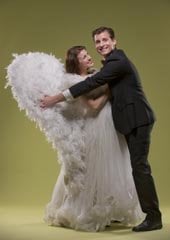
Photos by David Allen
Luckily no thousand-dollar bet was made when I challenged Greg MacKellan about the one thing in the world I know for sure. He still won, albeit circuitously, because the context was Broadway history, and there is nobody who knows or cares more about it than MacKellan, founder and artistic director of 42nd Street Moon.
At the Saturday premiere of this Broadway-reviving/resuscitating organization's production of I Married an Angel, I heard the Hungarian capital's name mispronounced at times ("Budapest" instead of "Budapesht") and asked MacKellan why the cast is inconsistent about it.
No, he said, barely suppressing a sly smile, they are consistent. All the Hungarian characters pronounce it correctly, except the "American girl," who gets it wrong. Oh.
There is meaning behind this seemingly trivial exchange: Although the strength of 42nd Street Moon is in bringing to life half- or fully-forgotten Broadway with passionate dramatics and great good humor, it is also an organization that upholds tradition and pays attention to detail.
The company's proven prowess is being tested by the Richard Rodgers-Lorenz Hart musical, not among the best of Rodgers' music or Hart's lyrics. The original book is both simple and flimsy: An angel descends to marry a banker, creates havoc with her angelic ways (excessive honesty and banking practices don't mix well), the marriage (along with the bank) is saved by the angel learning to be "an irresistible bad girl." And so on to a big production number, "At the Roxy Music Hall." And curtain.

MacKellan tells the background and history of the musical:
Based on an earlier Hungarian fantasy by János Vaszary, it had originally been conceived in 1933 as a film musical for Jeannette MacDonald, a follow-up to the team's innovative 1932 film Love Me Tonight. The movie was never made, and the cancellation ended Rodgers and Hart’s Hollywood sojourn ...Their lost MGM project haunted them, though, and they eventually bought the screen rights back from MGM. They had faith in the project, and wanted to turn it into a stage musical. [They] tailored the part of Countess Peggy Palaffi specifically for Larry Hart's good friend, the luminous musical star, Vivienne Segal. Dennis King as Willy, Vera Zorina as Angel, Walter Slezak as Harry, and Audrey Christie as Anna Murphy joined Segal in the cast.
The critical reception was rapturous — The New York Times proclaimed the show "a gay and capricious delight ... a winged wonder-work from the musical theater heavens of Rodgers and Hart." Three songs immediately became popular hits, "I Married an Angel," "I'll Tell the Man in the Street," and the wondrous "Spring is Here."
The show played a year on Broadway (a long run for the Depression era), and then toured for another year, closing at the San Francisco’s Curran Theater in 1940. MGM finally made the film (with MacDonald and Eddy), but the score was gutted, and the end result was a resounding flop. The show then essentially disappeared for 20 years.

There was a revival of the original version in an off-Broadway concert production in the 1980s, otherwise nothing on Broadway or by any major theater company anywhere since. The reason: forgettable music (including, for me, the title song; "Spring Is Here" is the one to take away from the show), a thin plot, a slow first act, and fun but obviously and arbitrarily padded second act.
And yet, with all that, this is an enjoyable production, with a fine cast, and the usual dynamic "orchestra" of music director/pianist Dave Dobrusky and Nick di Scala on woodwinds.
Kari Yancy makes the best of the difficult title role, Sean Thompson is the male lead as the wishing-for-angel and bank shortfall salvation Count Palaffi. Standouts in 42nd Street's usual big cast on a tiny stage: the hilarious Allison F. Rich as Peggy Palaffi; Halsey Varady as the troublesome American girl; and the vocally always precise Bill Fahrner as Harry Szigetti.
Among attractions of the second act: taking a twisted leaf from Die Walküre, four angels visit their (voluntarily) fallen sister, only to end up losing their wings (wink, wink); Yancy confronting erratic humans first as a trouble-making good (albeit wingless) angel, then as a problem-solving bad girl; and, yes, that Roxy Music Hall number, whether it has anything to do with the story or not. It doesn't.
One totally unimportant victory for a native speaker, cheated out of his righteousness about Budapest/Budapesht: the currency is called pengő, with a long umlaut, pronounced peng-"e as in err" but longer, not pengo. Should have bet big one on that.

